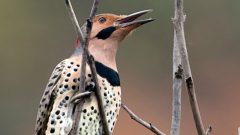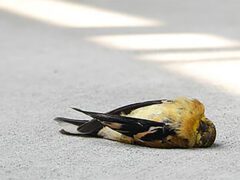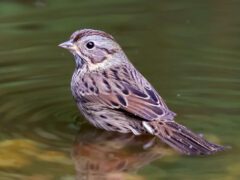The Four Keys to ID
- Size & Shape
Flickers are fairly large woodpeckers with a slim, rounded head, slightly downcurved bill, and long, flared tail that tapers to a point.
Relative Size
Larger than a Hairy Woodpecker and smaller than a Pileated Woodpecker.

 between robin and crow
between robin and crowMeasurements
- Both Sexes
- Length: 11.0-12.2 in (28-31 cm)
- Weight: 3.9-5.6 oz (110-160 g)
- Wingspan: 16.5-20.1 in (42-51 cm)
© Warren Lynn / Macaulay Library
- Color Pattern
Flickers appear brownish overall with a white rump patch that’s conspicuous in flight and often visible when perched. The undersides of the wing and tail feathers are bright yellow, for eastern birds, or red, in western birds. With a closer look you’ll see the brown plumage is richly patterned with black spots, bars, and crescents.
© Matt Davis / Macaulay Library - Behavior
Northern Flickers spend lots of time on the ground, and when in trees they’re often perched upright on horizontal branches instead of leaning against their tails on a trunk. They fly in an up-and-down path using heavy flaps interspersed with glides, like many woodpeckers.
© Ryan Schain / Macaulay Library - Habitat
Look for flickers in open habitats near trees, including woodlands, edges, yards, and parks. In the West you can find them in mountain forests all the way up to treeline.
© abbi gomersall / Macaulay Library
Regional Differences
Ornithologists recognize four Northern Flicker subspecies groups: "Yellow-shafted," "Red-shafted," "Cuban," and "Grand Cayman Island." The "Yellow-shafted" group occurs in the eastern U.S. to Texas and the Great Plains and extends across the boreal forest of Canada to central Alaska. The "Red-shafted" group ranges across western North America from southern Alaska to Oaxaca, Mexico. The key difference between these two groups is the color of the flight-feather shafts, which are either a lemon yellow or a rosy red. "Yellow-shafted" Northern Flicker has a tan face, gray crown, and red crescent on the nape. The male has a black mustache stripe. "Red-shafted" Northern Flicker has a gray face, brown crown, and no nape crescent. The male shows a red mustache stripe. Hybrids look intermediate and are common at the edges of these two groups’ ranges. The "Cuban" and "Grand Cayman Island" groups are restricted to their respective namesake islands. These two groups, both highly arboreal, are similar in appearance to the "Yellow-shafted" group.


























